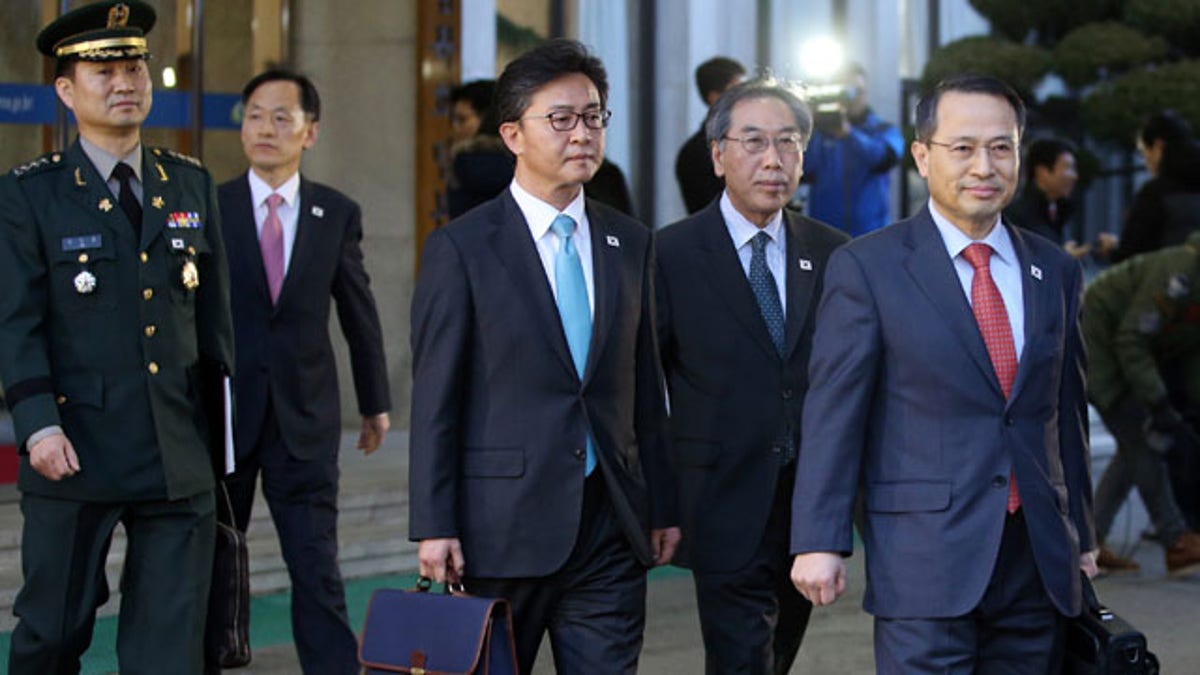
February 12, 2014: South Korean delegates leave for the border village of the Panumjom to meet their North Korean counterparts, at the Office of the South Korea-North Korea Dialogue in Seoul. (AP Photo/Yonhap, Kim Ju-song) KOREA OUT
Senior officials from North and South Korea met Wednesday at a border village, their highest-level talks in years and a potential signal that Pyongyang wants better ties and the resumption of lucrative cooperative projects.
Seoul officials said the meeting was requested by North Korea, which has launched a recent charm offensive after raising tensions last spring with repeated threats to fire nuclear-tipped missiles against Seoul and Washington. Later this month, the rival Koreas are holding reunions of families separated since the 1950-53 Korean War. It would be the first such reunions in more than three years.
Wednesday's meeting began with no fixed agenda, but South Korea wants to discuss ways to make the reunions run smoothly and whether to pursue them regularly, according to Seoul's Unification Ministry, which is responsible for ties with North Korea. The details of Wednesday's closed-door meetings weren't immediately available.
"For the North, if it comes back with an accomplishment in terms of improved South-North ties, it will mean a better atmosphere for Kim Jong Un to visit China and a justification to pursue high-level talks with the United States," said Cheong Seong-chang, an expert at the Sejong Institute outside Seoul, according to Reuters.
The North has demanded that the South and the U.S. scrap the military exercises, due to start this month, but both sides have plenty of incentives to seek a deal that could break their long stalemate, Reuters reported.
North Korea canceled planned reunions at the last minute in September, but outside analysts say it's unlikely that North Korea will halt the reunions this time because it needs improved ties with South Korea to help attract foreign investment and aid.
South Korea has so far dismissed North Korea's recent proposals for a series of measures that Pyongyang says are needed to ease tensions, saying the North must first take nuclear disarmament steps and show how sincere it is about its stated desire to improve ties.
Wariness in Seoul is still high because of a weeks-long barrage of threats and provocations last spring from Pyongyang after international condemnation of its third nuclear test. Pyongyang, which has repeatedly vowed to expand its nuclear arsenal, is trying to build nuclear-armed missiles that can reach the continental U.S., but most experts say the country has yet to master the technology needed to mount an atomic bomb on a missile.
Last month, the top U.S. intelligence official said that North Korea has expanded the size of its uranium enrichment facility at its main nuclear complex and restarted a reactor that was used for plutonium production before it was shut down in 2007.
The chief South Korean delegate at the meeting, Kim Kyou-hyun, is a vice-ministerial-level national security official. The North Korean delegation is headed by senior ruling Workers' Party official Won Tong Yon, a veteran official specializing in ties with Seoul. North Korea demanded South Korea send a senior Blue House official to the meeting, according to Seoul's Unification Ministry.
The meeting is the highest between the Koreas in years. They held a series of high-level meetings in 2007, including a second summit of their leaders, according to the Unification Ministry.
Nuclear envoys met in 2011 on the sidelines of a regional security forum in Indonesia. Since then, ties have become increasingly bad. Last June, plans to hold a high-level meeting fell apart because of a protocol dispute over who would represent each side.
North Korea is expected to demand on Wednesday that South Korea agree to restart a lucrative joint tourism project in North Korea, increase humanitarian aid and downsize the upcoming military drills with the U.S., said Yoo Ho-yeol, a professor at Korea University in South Korea.
Yoo said the fact that North Korea proposed the meeting and is sending an important official specializing in inter-Korean ties is a sign it wants to showcase its desire for better ties in a "more explicit manner."
The Korean Peninsula technically remains in a state of war because the Korean War ended with a cease-fire, not a peace treaty.
South Korea halted all trade and most investment with the North in May 2010 after the sinking of one of its warships, which it blamed on Pyongyang, Reuters reported.
A joint factory in North Korea's border city of Kaesong is the last remaining symbol of economic cooperation between the two Koreas.
The Associated Press contributed to this report.
